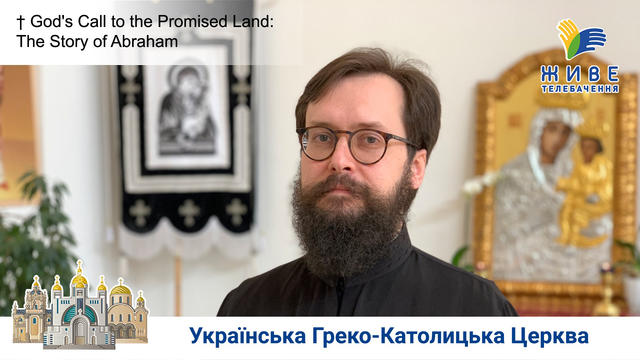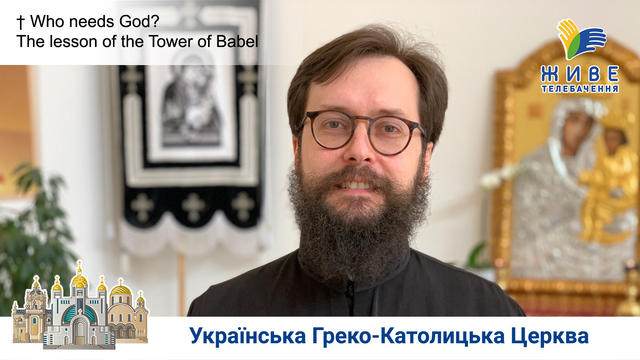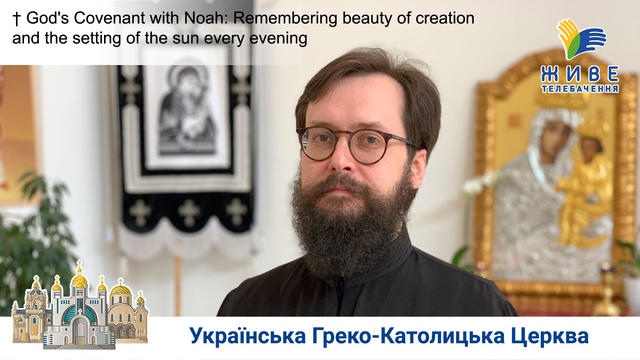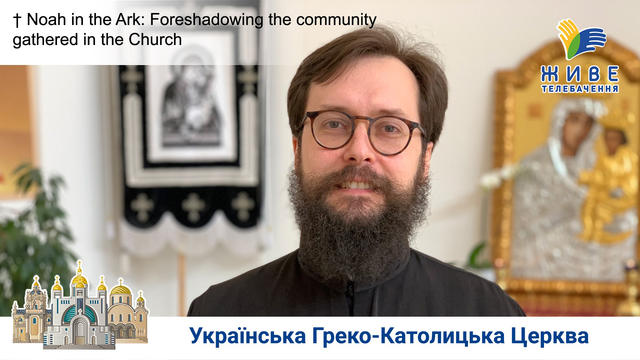Day 3: Noah's Nakedness: Caring for those in need. Great Lent Retreat Online
Day 3: Wednesday, 25 March 2020
Noah's Nakedness: Caring for those in need
After Noah and his family left the Ark and made a covenant with God in the previous readings from Monday and Tuesday this week, we hear today about what happened next. Today’s reading from the Book of Genesis, Genesis 9:18–10:1, is as follows:
The sons of Noah who went forth from the ark were Shem, Ham, and Japheth. Ham was the father of Canaan. [19] These three were the sons of Noah; and from these the whole earth was peopled. [20] Noah was the first tiller of the soil. He planted a vineyard; [21] and he drank of the wine, and became drunk, and lay uncovered in his tent. [22] And Ham, the father of Canaan, saw the nakedness of his father, and told his two brothers outside. [23] Then Shem and Japheth took a garment, laid it upon both their shoulders, and walked backward and covered the nakedness of their father; their faces were turned away, and they did not see their father's nakedness. [24] When Noah awoke from his wine and knew what his youngest son had done to him, [25] he said, "Cursed be Canaan; a slave of slaves shall he be to his brothers." [26] He also said, "Blessed by the LORD my God be Shem; and let Canaan be his slave." [27] God enlarge Japheth, and let him dwell in the tents of Shem; and let Canaan be his slave." [28] After the flood Noah lived three hundred and fifty years. [29] All the days of Noah were nine hundred and fifty years; and he died. [1] These are the generations of the sons of Noah, Shem, Ham, and Japheth; sons were born to them after the flood.
The main part of the story that I would like to focus on today is Noah’s drunkenness and nakedness, and how his sons treated him. We might ask ourselves, what is going on here? Wasn’t Noah saved from the flood because God saw that he was a righteous man, not like the others on the earth? Isn’t that why God saved him? Then why is Noah getting drunk on wine immediately after he and his family left the Ark and made a covenant with God? These are all good questions.
First of all, if we look carefully, the text of the Scriptures simply state that Noah planted a vineyard, drank the wine that was produced by its grapes, felt the effects of the wine, that is, became drunk, and lay down in his tent, naked, as was common in that time and climate. Nothing more, nothing less.
The Fathers of the Church who comment on this passage are quite clear on this: getting drunk is not good, but there is nothing wrong in itself with making or drinking wine and cultivating vineyards. St. John Chrysostom states this clearly:
Perhaps some might say: “Why was vine dressing, the source of such terrible wickedness, introduced into life?” Do not idly blurt out what comes into your head, O man: vine dressing is not wicked nor is wine evil—rather, it is use of them in excess. You see, dreadful sins arise not from wine as such but from intemperate attitudes of human depravity that undermine the benefit that should naturally come from it... (St. John Chrysostom, Homilies on Genesis 29.10)
Other commentators are even more direct. Theodoret of Cyrus prefers to show mercy, saying that Noah simply had not had wine since before the flood, thus it was a question of inexperience rather than intemperance (Theodore of Cyr, Questions on Genesis 56). Saint Ephrem the Syrian says the same: Noah was not bad or irresponsible, he simply didn’t know.
Some Church Fathers, such as St. Cyprian of Carthage and St. Jerome, even go so far as to compare Noah with Christ and present this episode from the Book of Genesis as a type of the Passion of Christ, pointing to the cup of wine, the humiliation in nakedness, and the mercy by the sons as foreshadowing the Crucifixion.
Rather than dwell on this point, or the dishonour shown to Noah by his son, Ham, I would like to turn to the act of mercy that Noah’s other two sons, Shem and Japheth, showed him. There are numerous examples in the Scriptures of why we should honour our parents. The first that might come to mind is the fourth Commandment given to Moses: “Honour your father and your mother, that your days may be long in the land which the LORD your God gives you.” (Exodus 20:12). St. Paul reminds us that this is the first of the ten commandments that God gives Moses, where there is a promise to those who keep and obey it (cf. Ephesians 6:2). Christ Himself repeated this command and condemned the Pharisees who tried to wiggle out of this obligation, by saying that if someone honours God, they are exempt from caring for their parents (cf. Matthew 15:5–6).
But even without such a command, Noah’s two sons showed mercy on him out of respect for his fatherhood, his personhood, because they knew that their father’s intention was not evil or malicious. He simply did not know what the wine would do to him. Covering the nakedness of their father was a sign of giving him the benefit of the doubt, knowing that he is good at heart, and not allowing others to abuse and mistreat him because of his weakness.
When I was a student, I had the opportunity to work for a professor who had entered retirement after a long life of service as a teacher and researcher. I had known him as a brilliant mind and a source of wisdom in my youth. But as he grew older, he began to forget and at times get angry at himself and others because his memory was fading. In his frustration, it was often difficult to work with him or be with him. But at one point another student wisely told me these simple words: “We must remember to cover Noah’s nakedness.” At first I did not understand, but then it became clear. Our beloved professor could not be held responsible for being unwittingly vulnerable. He needed the help of his children and his students, he needed them not to look upon his faults, but to shield him from mockery and cover him with their love.
Whether our parents or grandparents are alive or not, or whether we are close to our teachers and parents or not, in these days, despite our isolation, we will likely come into contact with someone older than us who needs our help or someone who is vulnerable and in a position of weakness who needs our guidance or support.
How will we choose to respond to them with our actions and our emotions? Let’s take a step back to think about this, considering what God has shown us thus far in our reading of the Book of Genesis. On Monday, we saw how God invites us to enter into the innermost chamber of our heart to hear God’s voice speaking to us there. The example of Noah and the Ark encourage us to withdraw from the tumult of this world. On Tuesday, God’s covenant with Noah invited us to contemplate nature and enjoy the beauty of creation, as stewards and co-operators. This showed us how to relate to the environment around us. Today, we encounter Noah as a vulnerable man in his nakedness, mocked by one of his sons and protected by two other sons. Let there be no doubt that withdrawing into our hearts or waiting out the storm in our Ark does not mean we should neglect our neighbours!
In fact, the whole journey to Pascha – the celebration of the Resurrection of Christ and the triumph of God’s Love for us — is marked with signposts showing us that we cannot simply hide inside of ourselves along the path to Christ, ignoring our neighbour. If we try to follow Christ on the road going up to Jerusalem, to follow Christ to His Passion, and we ignore the man beaten and lying in the ditch on the side of the road, we won’t make it very far (cf. Luke 10:25–37).
Our Lenten journey with Christ to His Passion and Resurrection makes some stops along the road. After His triumphal Entry into Jerusalem, which we celebrate on Palm Sunday, Christ teaches His apostles and disciples in the Temple in Jerusalem. Among His parables are those concerning the Last Judgement, as recounted in the Gospel of Matthew, in chapters 24, 25, and 26. In the Parable of the Sheep and Goats, we learn about the criteria God will use to judge us throughout our Lenten journeys and throughout our lives. Christ asks us to feed the hungry, give drink to the thirsty, accept the stranger, clothe the naked, and visit the sick and imprisoned. But we answer: “`Lord, when did we see thee hungry or thirsty or a stranger or naked or sick or in prison, and did not minister to you?' [45] Then he will answer, `Truly, I say to you, as you did it not to one of the least of these, you did it not to me.' [46] And they will go away into eternal punishment, but the righteous into eternal life." (cf. Matthew 25:31–46).
Our Church tradition wisely prescribes that we read this Gospel parable twice: once before we arrive at the commemoration of the Passion and Resurrection of Christ in Holy Week, and once before we begin our journey in Lent on Meatfare Sunday, the Sunday of the Last Judgement. And as a reminder that this Lenten journey calls us to enter into prayer with God by going deeper into our heart; to fast by renouncing food, which was the cause for Adam and Eve’s banishment from Paradise; and to do acts of mercy and give alms. Our liturgical prayer constantly mentions all of these elements of true fasting in Great Lent in the hymns from the Triodion that we sing in church or, if necessary, that we pray at home, now that we are under quarantine.
The text of one such hymn, from Matins on the Second Thursday of Great Lent, reminds us of our obligations towards those in need:
It is the season of repentance, * wherein Lenten ascetic struggle leads to eternal life, * let us therefore stretch out our hands in virtuous deeds, * for nothing saves the soul so much * as being merciful to those in need; * for almsgiving combined with fasting * delivers a man from death. * Let us do all this with gladness, ** for this suffices to save our souls. (Aposticha, Matins, Second Thursday of Great Lent)
In the continuation of our Lenten journey, let us call upon God to allow us to find a balance between contemplation and action, teaching us how to hear God’s voice in our hearts and His voice in the poor and hungry who are around us — inspiring us to leave our Ark to help them, but at the same time to envelope them with our love and cover them with prayer in our hearts.
Let us end today with a prayer, a hymn from the Triodion:
Slaying the passions, * the present Fast brings the promise of healing * to those grievously wounded by sin. * God has bestowed the Fast upon us to help us: * let us honour and accept it * as if it were the divinely-written tablets of the Law, * given through Moses. * Let us not choose wanton self-indulgence, * through which the tablets were once shattered; * let us not perish with those whose carcasses fell in the wilderness. * Let us not be like the Judeans, of a sad countenance, * rather, let us rejoice with the Church. * Let us not be hypocrites like the Pharisees, * but in the spirit of the Gospels let us put on the beauty of holiness, ** glorying in the Cross of Christ the Redeemer of our souls. (Aposticha, Matins, Second Friday of Great Lent)



